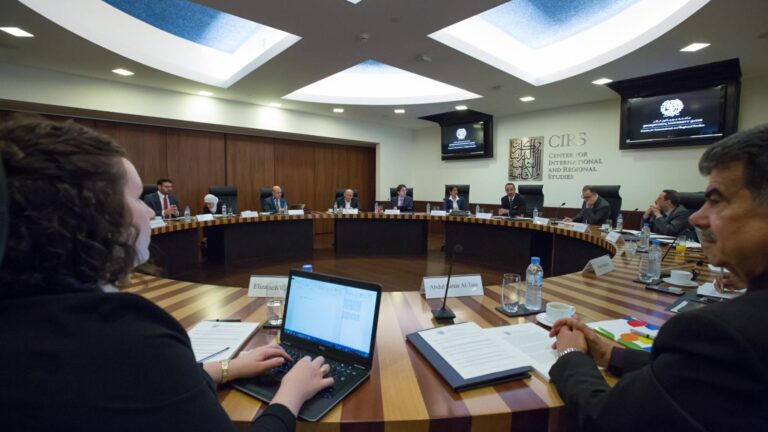Focused Discussions, Race & Society, Regional Studies
Science and Scientific Production in the Middle East Roundtable

In February, 2018, CIRS convened a one-day roundtable meeting to bring together scholars, scientists, experts, and business practitioners with extensive experience on science and scientific production in the Middle East. Over the course of a day the participants engaged in a vibrant and open conversation on the opportunities and constraints of conducting scientific research in the region.
Among other things, participants in the roundtable explored the influence of culture, coherence, continuity, and consensus on the development of SDI; and transnational collaborations and networks, along with local patronage which funds such relationships, which enable world-class scientific research, even in areas that don’t promise immediate financial return. The participants also discussed the need to encourage scientific indigeneity and internationalization of Middle Eastern scientific production. Moreover, the participants highlighted the relationship between Islam and science, which has been one of the main issues in contemporary intellectual discourses in the Muslim world, particularly in the Middle East; and the impact of the Arab uprisings on science and scientific advancement. Finally, the participants concluded the roundtable discussions by focusing on the impact of sanction regimes on scientists and scientific production in the Middle East with a particular focus on Iran.
Key gaps in the literature on science and scientific production in the Middle East that emerged out of the discussions were:
- Structural and bureaucratic limitations to the development of SDI in the Middle East.
- Self-censorship in disseminating sensitive research findings to the Middle East’s general public.
- The gap between society and the scientific community, and access to foreign technology, scientific discovery, research, etc.
- The role scientific networks and collaborations play in exchange of ideas and technological transfer between Middle Eastern countries and other parts of the world.
- Networks and transnational collaborations’ contribution to building local capacity, and continuity and sustainability of scientific research within an individual country.
- Sanction regimes a blessing or a curse? Although sanctions restrict external funding for research and equipping labs, they can contribute to scientific indigeneity.
- The issue of capturing transnational collaborations between local and foreign research institutions.
It is worth mentioning that CIRS will launch a research initiative that addresses some of these gaps, among others, in the near future.
- For the roundtable agenda, click here.
- For the roundtable participants, click here.
- For the research initiative, click here.
Article by Islam Hassan, Research Analyst at CIRS